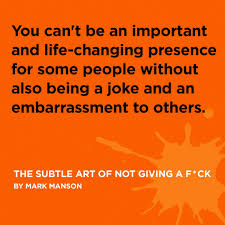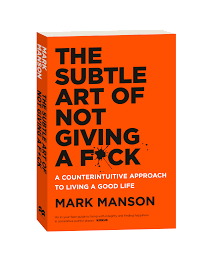Don’t Try {Courageous Teaching Part 2}
 “Don’t Try.”
“Don’t Try.”
That’s the title of a chapter in the book I just finished (more on that later). It reminds me of what Yoda is touted as saying: “Do or do not. There is no try.” But really my current understanding — or appreciation — of this sentiment is that we try too hard to BE everything and DO as much as possible. I’m aware of a rising sense of clarity within myself that suspects that maybe we should NOT TRY to DO and we should also consider simply NOT DOING. Here’s the idea:
“Our culture today is obsessively focused on unrealistically positive expectations: Be happier. Be healthier. Be the best, better than the rest. Be smarter, faster, richer, sexier, more popular, more productive, more envied, and more admired…
But when you stop and really think about it, conventional life advice — all the positive and happy self-help stuff we hear all the time — is actually fixating on what you lack. It lasers in on what you perceive your personal shortcomings and failures to already be, and then emphasizes them for you.”
 This is an excerpt from Mark Manson’s book called “The Subtle Art of Not Giving a F*ck”. Now, before you get turned off, which I realize maybe some of you will (some of you more likely will be fist pumping right now) let me say this. Although this book uses its title as total shock factor (in the author’s own words it’s meant to slap Millennials in the face and get their attention) it touches on one of the most crucial ideas of being human: our values.
This is an excerpt from Mark Manson’s book called “The Subtle Art of Not Giving a F*ck”. Now, before you get turned off, which I realize maybe some of you will (some of you more likely will be fist pumping right now) let me say this. Although this book uses its title as total shock factor (in the author’s own words it’s meant to slap Millennials in the face and get their attention) it touches on one of the most crucial ideas of being human: our values.
Not giving a f*ck is really about CHOOSING, actively and repeatedly, exactly what to give a f*ck about; figuring out a way to throw yourself into what really matters rather than being mesmerized with (and preoccupied by) being everything to everyone and ultimately falling short every time because…it’s impossible! What do we most give a f*ck about? This is where values come in.
What are you most committed to being? In what way are you most committed to acting? Who do you choose to cultivate relationships with? What motivates you to do anything? What’s the basis for your judgments of a good and valuable life, a good and meaningful career? It all comes down to values.
The problem is that most of us are, at the very least, suffering from value-confusion. Worst case scenario, we are driven by values that are vague, given to us by other people (our families, friends, TV – seriously cultural influences should not be underestimated in this exploration) and never examined to check-in and see if they are what WE would choose, right now, in our lives.
Our values dictate the quality of our problems, says Manson. If we have clear, authentic values then the problems we have are those that will lead us to learning, growth, expansion, awareness, and fulfillment, which is not the same as a perfect life. Because life IS suffering, we just choose how and with regard to what we suffer for. Suffering for honesty, kindness, creativity, and generosity leaves us feeling more fulfilled in the end than suffering for being right, being liked, being rich, being a part of the crowd. Name your poison, this list could go on and on and on.
How does this apply to teaching? Well, it may be obvious and it may not. For me, “don’t try” translates in the teaching arena as don’t try to be perfect (we talked about this at length in The Power of Imperfection: Courageous Teaching Part 1). Don’t try to be right. Don’t try to fix your students. Don’t try to fix yourself (that’s a slippery slope that only gets more treacherous by the moment). Here’s Manson’s take on it:
“At some point, most of us reach a point where we’re afraid to fail, where we instinctively avoid failure and stick only to what is placed in front of us or only what we’re already really good at.
This confines us and stifles us. We can be truly successful only at something we’re willing to fail at. If we’re unwilling to fail, then we’re unwilling to succeed.”
He continues to say that a fear of failure is driven by unexamined (“shitty”) values that are dependent on others and out of our control rather than dependent on us and within our control. Bad values, says Manson, are “process-oriented” meaning that they always a reflection of our interactions and how we’re relating to the world rather than imposed upon us as a finite quality or truth by someone else.
Courageous teaching is not only a willingness to be wrong (the power of imperfection), it’s not striving to be right. Beyond that, deeper than that courageous teaching is about being constantly — gently and with a great degree of self-compassion — willing to fail and examine what’s at your mental, emotional, psychological, spiritual core.
Call it whatever you want, knowing what your values are and teaching from them is courageous because it’s NOT always easy. In fact, it’s often really hard. Your values not only influence, or dictate, how you teach but also how you build your business, differentiate yourself among others, relate to and support your staff and students, how you handle adversity, competition, and success.
I LOVE talking about this stuff and I could do it all day. I hope that in some small way this has nudged you in a direction…maybe in the direction of “I hate this stuff and I’m finally going to unsubscribe because I can’t take another second of it” in which case I couldn’t be happier for you or me. Or maybe in the direction of “This is something I think might make a real difference for me and I’m curious to see where it’s going to lead”, in which case I’m also very happy.
To that end, happy failing. Happy suffering. Happy living and teaching. May the value-force be with you.
Here’s to moving toward what feels good not what feels easy,

Success or Failure? Who says?
(Your metrics and what values they’re based on.)
- Choose a success or failure that you’ve experienced lately. Can be teeny tiny or on the bigger side.
- Begin to ask: Why is this a success/failure? By what standards/metrics am I judging this as a success/failure.For example: You recently shared an idea with a colleague for a new class and they loved it. This is a colleague with whom you haven’t always seen eye-to-eye. You feel like this is a success because: You’re getting peer approval; your idea is being validated by someone who holds clout in the community, has more experience than you; it might mean that this person does like you, etc.
- Reflect on what your metrics (what criteria you’re using to judge success or failure — from above) tell you about your underlying value and whether or not this value is helping you live the kind of life you want, or become the kind of teacher you want to be.For example: In this same scenario, my metric that this is a success because the teacher is coming around to liking me is likely indicative of the fact that what other people think about me, or being liked, is a value I hold.


 How are you showing up? Why are you showing up? Why do you teach? What IS teaching? Why do you care? This is Skillful Teaching: A Whole-person approach to being an expert teacher, not an expert technician. There's a difference. Want to know what it is?
How are you showing up? Why are you showing up? Why do you teach? What IS teaching? Why do you care? This is Skillful Teaching: A Whole-person approach to being an expert teacher, not an expert technician. There's a difference. Want to know what it is?
Leave a Reply
Want to join the discussion?Feel free to contribute!